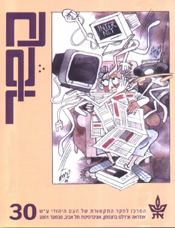|

"Walla Chat":
An Ehtnographic View of an Israeli Internet Chat Site
Von Dotan Blais
The author explores the nature of a virtual Israeli
community in terms of its communal values and the extent that they reflect
mainstream cultural values in actual society. Socio-linguistic patterns in
two Israeli chat rooms were examined – "Thirty-Plus" and "Forty-Plus" –
located in the Israeli portal, "Walla." Characteristic talk events and key
words were identified and studied as components of a linguistic code that
reveals underlying values, i.e., the permissible and the taboo in a chat
environment. This was followed by an analysis of the relationship between
the chat discourse, chat community identity, and mainstream cultural
identity.
As in all virtual communities, a series of linguistic
patterns and combinations were revealed, having symbolic connotations of
identity and status. Despite the absence in chat rooms of conventional
identifying characteristics such as gender, ethnic origin, age or
appearance, two distinct social categories emerged in the Walla chat rooms:
permanent and non-permanent participants, identified linguistically as "we"
and "they." The regulars largely set the parameters of the discourse and
tended to reproduce values that typify mainstream Israeli discourse. The
irregulars tended to undermine these chat norms.
The permanent participants established a consistent
identity and a sustained presence in the site, guarding their chat name
vigilantly. New or temporary participants had to demonstrate to the regulars
that they merited their attention, often by provocative remarks. Moreover,
non-permanent participants often changed names or "stole" names from, or
used similar names as, regulars. This evoked responses similar to those in
real-life situations when identity or status is stolen.
Other raw materials used in establishing a virtual
identity were specific words, sentences, linguistic virtuosity, rhetorical
ability, keyboard speed and dexterity, and the use of keyboard symbols.
Non-regulars purposely avoided establishing a recognizable "face" and kept
changing their identities, thereby enjoying greater freedom, preserving
anonymity and protecting themselves against harm to their "face."
A chat practice that served to enhance the coalescence of
the regulars was prolonged ritual greetings and farewells upon entry and
departure from the site, often punctuated by smiley and kiss symbols.
Temporary participants, by contrast, were not accorded these greetings, an
attitude comparable to that toward a tourist in a foreign country.
Alongside the solidarity-enhancing attitudes of the
linguistic practices in the chat site, participants have broad personal
space for self-expression, thereby justifying a definition of such sites as
a social body with a communal and tribal character. Clearly, however, not
all the participants in the Walla site are part of the community. Whether by
choice or as an intermediate stage in becoming members of the community, a
large segment of the participants are impermanent, and some constitute an
element of subversive opposition to the values of the community. They can be
aggressive and abusive sexually or otherwise. The non-permanent participants
help define the identity of the permanent participants in that they are
perceived as a threat to the community, to the pleasurability of the chat
experience, and sometimes to the solidarity of the community. This often
evokes assertive linguistic counter strategies by the permanent members
which weaken the non-permanents while reinforcing the normative community.
Sometimes, however, the permanent group is unable to overcome the opposition
of the outsiders. When a non-permanent participant feels no threat whatever
to his/her "face," his/her challenge or harassment can harm the group. The
existence of these two distinct social categories engenders perpetual
tension between the normative and the non-normative, and chat norms are
subject to the effects of recurring cycles of community buildup and
breakdown, or boundary establishment and violation.
In the absence of a perceived threat to their face, some
non-permanent participants go beyond challenging the community ethos and
attack the Israeli ethos. The response by the permanent chat community to
this kind of challenge is ambivalent, as their chat identity and their
broader Israeli identity only partially overlap. Linguistic patterns in the
chat discourse show a distinctively Israeli character, e.g., in an emphasis
on communal togetherness; recurring demands typical of the sabra attitude to
avoid intellectual pathos; and an Israeli approach to bereavement. These
patterns, however, appear to undergo a certain restructuring to fit the chat
mold.
Broadly, the author found that the identity of the
permanent participants wavers between an Israeli component and a virtual
component. His premise that culture, rather than medium, is the dominant
element both in the construction of chat discourse and in defining its
identity was not proven conclusively.
Kesher, No. 30, November
2001
Bestellen?
|